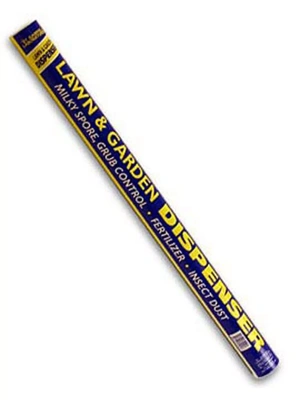Spread the Word About Organic Lawn Care
Click the "play" button to see the trailer for A Chemical Reaction.
A Chemical Reaction, an inspiring documentary, has triggered a call to action across the country to ban lawn and garden pesticides. Gardener's Supply is supporting this movie, which tells the story of one of the most powerful and effective community initiatives in the history of North America. It started with the lone voice of Dr. June Irwin, a dermatologist, when in 1984, she noticed a connection between her patients' health conditions and their exposure to chemical pesticides and herbicides. With persistence, she brought her concerns to town meetings to warn her fellow citizens that the chemicals they were putting on their lawns posed severe health risks and had unknown side effects on the environment.
FAQs
The following are from the Safelawns.org, sponsors of A Chemical Reaction. Safelawns is a nonprofit organization dedicated to promoting natural lawn care and grounds maintenance. For more information on reducing the size of your lawn, read Be a Grower, Not a Mower.
Why is organic better for my lawn?
There are multiple reasons why organic products are the best choice in lawn care. They are safer for humans, pets and the environment than synthetic fertilizers and pesticides; They improve the quality of the soil, which will have an increased ability to retain water and nutrients; You will enjoy significant financial savings by transitioning from synthetic to organic lawn care, especially after the first year of use; Organic products will significantly reduce pests by restoring balance to your lawn's ecosystem; You will benefit from reduced maintenance in mowing, watering and fertilizing because you will have a naturally stronger and healthier lawn.
What are the health risks associated with lawn care chemicals?
Scientific studies have found numerous negative health consequences associated with the synthetic chemicals found in traditional lawn care products. A report by the National Academy of Sciences shows that the health of 1 in 7 people is negatively impacted in some form by lawn pesticides; Numerous studies link lawn chemicals to cancers and other long-term diseases; Several studies also link exposure to artificial lawn chemicals to an increased risk of cancer and other health problems in pets. Children are especially at risk for negative health consequences due to their size, physiological development and proximity to the ground. Studies from Yale University, Mt. Sinai Medical Center and several others point to children's health risks associated with synthetic fertilizers and pesticides.
What is the Government doing to protect people from the risks of lawn care chemicals?
Very little. The U.S. Environmental Protection Agency (EPA) evaluates products on the basis of 'risk-reward', in which the potential health risks of a product are balanced against its potential economic value to the manufacturer or society as a whole. The EPA, by its own admission, states that approval of a lawn care product in no way guarantees product safety. Some local governments are taking matters into their own hands, passing state or local ordinances that ban applications of synthetic lawn chemicals though the federal government has not yet taken any such steps.
Synthetic pesticides and fertilizers destroy the naturally present beneficial organisms in a healthy lawn's ecosystem. This destruction then transforms your lawn into an increasingly needy 'junkie', requiring more and more chemicals to sustain it. Organic lawn care focuses instead on soil management techniques and long term results, building up the nutrients and organisms in the soil in order to make your lawn better able to withstand drought, pests, and other common problems. Organic lawn care also eliminates damage to the environment and to human and animal health caused by synthetic lawn care products.
Aren't organic products more expensive and less effective?
It's a comparison of apples and oranges. Since organic products function by building up 'life in the soil', or soil biology, their payoff is more long-term and lasting. Synthetic products, by their nature, are instantaneous and must be frequently reapplied in greater amounts to maintain the appearance of the grass. Due to the need for frequent reapplications and the reduced effectiveness of synthetic chemicals, the user of organic products will spend considerably less money on lawn care over a two-year period than the user of synthetic fertilizers and pesticides.
What does lawn care have to do with global warming?
The mowing, watering and fertilizing in lawn care contributes approximately 2 percent of the United States' overall fossil fuel consumption. Additionally, lawn care activities account for 10 percent of air pollution, according to the EPA. A reduction in mowing, watering and fertilizing will reduce the levels of greenhouse gases.
I've heard that agricultural pesticides are a leading cause of water pollution. Can using synthetic fertilizer be contributing to the problem?
Absolutely. NASA scientists estimate that lawn run-off contributes up to 20 percent of the water pollution that causes 'the Dead Zone' at the basin of the Mississippi River in the Gulf of Mexico. 'The Dead Zone' is an area the size of Rhode Island where no fish or sea life can exist due to eutrification, a term used to describe the removal of oxygen from the water because of excessive amounts of decomposed organic matter and nutrients. Also, studies on Long Island show that up to 60 percent of synthetic nitrogen applied to lawns ends up contaminating ground water.
My area has water restrictions during the summer months. Will organic lawn care harm or help my efforts to keep my yard looking beautiful?
The primary benefit of organic lawn care is the soil's increased ability to retain water, thereby maintaining the lawn's optimum appearance during periods of drought. Organic soil management increases the 'sponge' factor of soil, reducing the watering needs of the lawn by more than 50 percent in most cases.
Are organic fertilizers good for the environment?
Organic fertilizers come from sustainable, renewable sources, such as alfalfa and other natural biological materials, which do not contribute to global warming. When these fertilizers are applied to the soil, they are unlikely to leach into groundwater and are far more likely to improve soil health, fertility, and water retention capacity. Organic fertilizers are like building an annuity for your lawn that will pay you back for many years to come.
Last updated: 03/11/2024
Print this Article:
Related items
Get the Dirt
Stay up to date on new articles and advice. Please fill out the information below.











